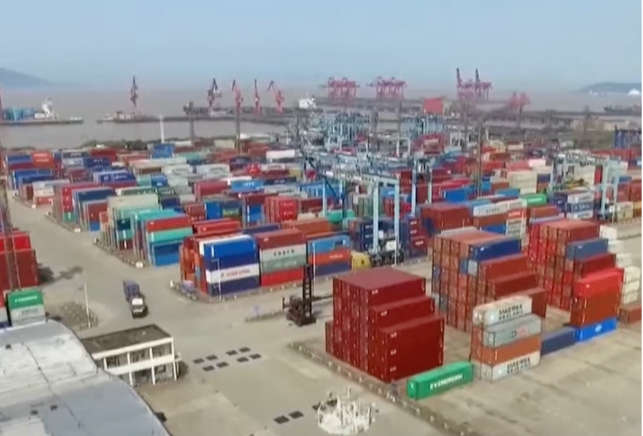News
What Tariffs? China Trade Surplus Hit Nearly $1 Trillion in 2024

Source: YouTube
In 2024, Chinese exports soared to a record $3.58 trillion and resulted in a China trade surplus of $990 billion. This figure dwarfs historical surpluses from countries like Japan and Germany. Analysts attribute this to several factors, including a weakening yuan, aggressive export strategies, and subdued domestic consumption.
Chinese manufacturers have capitalized on global demand to offset weak domestic spending, especially in sectors like real estate and consumer goods. The staggering China trade surplus also reflected the country’s continued investment in infrastructure, education, and manufacturing. For example, the “Made in China 2025” initiative aimed at boosting self-reliance pushed the nation to become the world’s largest exporter of manufactured goods.
A Looming Tariff War with the U.S.
Facing a large China trade surplus, President-elect Donald Trump promised to reimpose and escalate tariffs on Chinese goods and reignite trade tensions. Trump’s proposed tariffs threaten to upend China’s export-driven growth model. Analysts warn that higher tariffs could force Chinese firms to flood alternative markets and potentially destabilize global trade networks.
The prospect of a tariff war prompted Chinese companies to expedite shipments to the U.S., evident in the 10.7% year-on-year export growth in December 2024. However, sustained trade barriers may compel China to diversify its export destinations, increasing competition in regions like Southeast Asia, Africa, and Europe.
China Trade Surplus: Impacts on the Global Economy
The huge China trade surplus carries significant implications for the world economy. By flooding global markets with low-cost goods, the country exerts downward pressure on prices which benefit consumers but strain competing industries. Countries with nascent manufacturing sectors such as India and Brazil are particularly vulnerable.
Moreover, the China trade surplus in sectors like solar panels, electric vehicles, and robotics challenged industrialized economies and raised concerns about potential job losses. In response, many nations, including the U.S. and EU members, have erected tariff barriers to protect domestic industries.
The China trade surplus also highlights a broader shift in global economic power. The country’s ability to maintain high export volumes despite geopolitical tensions has signaled its growing influence. However, overcapacity in certain industries risks triggering deflation and loan defaults, which could spill over into the global financial system.
Why China Is Accelerating Its Export Program
China’s push to accelerate its export program stems from a variety of economic and geopolitical factors. One major driver is the prolonged property market slump and cautious consumer spending, which have dampened domestic demand. By focusing on export growth, China can sustain jobs and stabilize its economy, mitigating the impact of its internal economic struggles.
The weakening yuan has also played a crucial role in boosting exports. As the currency depreciates, Chinese goods become more competitive in global markets and allow manufacturers to increase their market share abroad. This currency-driven advantage helps offset the challenges posed by sluggish domestic consumption.
Geopolitically, China’s export strategy serves as a buffer against anticipated trade tensions with the United States. With President-elect Donald Trump’s promises of higher tariffs on Chinese goods, Beijing is proactively diversifying its trade relationships to reduce reliance on the U.S. market. This strategy not only strengthens China’s global trade presence but also prepares its economy for potential shocks from renewed tariff wars.
A Balancing Act: Risks and Opportunities
While the large China trade surplus bolsters its economic position, it also carries risks. Over-reliance on exports makes the economy vulnerable to external shocks, such as tariff hikes or global demand slowdowns. Additionally, countries targeted by China’s aggressive trade policies may retaliate with protectionist measures and further strain relations.
For the global economy, China’s export dominance presents both opportunities and challenges. On one hand, affordable goods benefit consumers and businesses worldwide. On the other, trade imbalances fuel economic nationalism and disrupt global supply chains.
Business owners of The Capitalist, do you support applying tariffs to Chinese imports? Tell us what you think!



